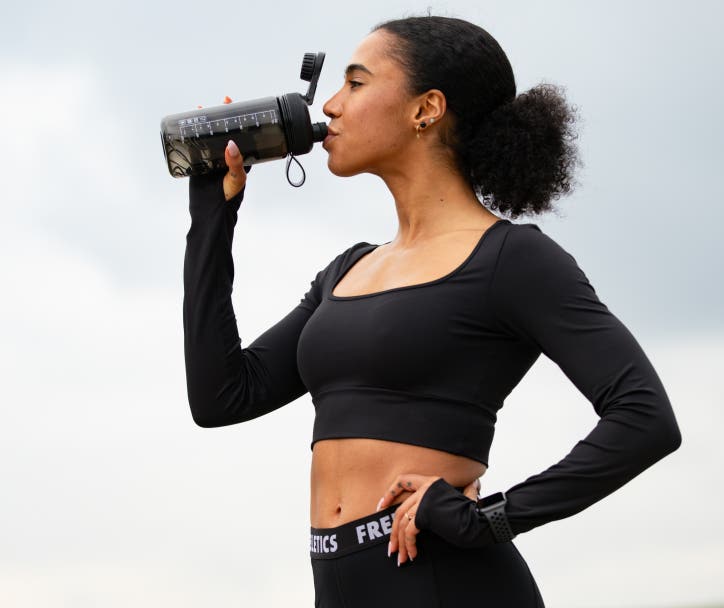Whether you’re a beginner or a seasoned marathon runner, you won’t go far without the right fuel. And while we do need fuel to go the distance, our bodies are a little more complex than a car tanking for mileage.
Let’s dive into the nutritional fundamentals that every runner should know.
What is nutrition for runners?
In a runner’s world, food is fuel—regardless of your level. What types of food you choose will determine how much energy you have for your run and how well you perform overall. Choose wrongly, and you could leave yourself open to slower, sluggish runs or worse – some mid-run cramps or stomach issues that’ll force you to turn back early. Not a great feeling when you’re hoping to tack on the miles.
Having said that, how can you create a fuel plan that will meet your running goals? Let’s break it down.
When constructing the perfect diet for runners (yes, you!), it's important to take into account your caloric needs, influenced by the following factors:
- Height
- Weight
- Energy expenditure
- Running distance
And your runner’s meal plan should also include a well-balanced mix of the three macronutrients to fuel the body and facilitate recovery:
- Carbohydrates
- Proteins
- Fats

The importance of macronutrients
Macronutrients are the “big three” components of nutrition and are vital for all athletes. But did you know that your goal and activity levels determine your optimal macronutrient ratios? For example, cardio-based exercises, like running, require a high carbohydrate intake to stop energy stores from being depleted.
Each macronutrient is associated with a specific function:
- Carbohydrates for energy
- Fat for a secondary energy source
- Protein for muscle recovery
Carbohydrates for energy
Carbohydrates are the most important fuel source for exercise. Although protein and fats are essential for a well-balanced diet, getting your carb ratio right could be the deciding factor in whether you “hit a wall” during a run. Of course, balance is key – going overboard on the carbs might lead to some not-so-fun digestive discomfort during your run.
And as we discussed in this article, not all carbs are created equal. There are several types of carbohydrates, and the type of carb you choose can impact your performance. When you consume carbohydrates, they are broken down into glucose (sugar), which enters the blood and is used for energy. Any excess glucose can be stored in the liver or muscle tissue as glycogen until it is needed.1
During exercise, the body uses stored glycogen to fuel the activity – but it’s not a constant supply. Glycogen can be depleted within 120 minutes, which is enough to affect performance.
So, how much carbohydrates should you eat before you head out on your run? General guidance states that runners should try to consume between 30 to 60 g of carbohydrates per hour for three hours in an endurance run. Following that, it is recommended that athletes consume 60 g (to 90 g) of carbohydrates per hour of exercise for activities that last longer, such as a marathon.²
While the above guidance is a helpful place to start, it’s also very generic. Your carb-to-fat ratio will depend largely on the intensity and duration of your run. Make sure to check out our article on energy systems for an in-depth look at how fuel powers your run. It’ll help you to fine-tune your pre-run nutrition for maximum performance based on your goal.
Fats for secondary fuel source
Although carbs get all the hype in the running world, dietary fat is an important secondary fuel source. In fact, it is commonly recommended that 30% of total calories should come from fat.⁴ What’s more, a study involving 86 women running at least 20 miles per week found that those with a lower fat intake were 2.5 times more likely to suffer an injury.3
Protein for recovery
While carbs and fats are vital for energy and help you crush that mileage, your fuel-for-performance mentality shouldn’t stop there. Part of your strategy should prioritize repair and recovery – and this is where protein takes center stage.
The Recommended Daily Allowance (RDA) for protein is 0.8 grams per kilogram of body weight.5 For anyone who takes part in endurance activities, such as marathon running, it might be beneficial to double this amount and aim for a protein intake between 1.0 and 1.6g per kilogram of body weight per day.6

The dangers of underfueling
One big “no” for endurance runners is running on empty. Remember, food is fuel, and especially on a long run, your body requires it. Hitting the pavement when you've deliberately fasted or are in a carb-depleted state or even simply skipping that post-run meal can lead to detrimental consequences. It not only hinders muscle recovery, thus impacting your running performance, but it also wreaks havoc on your overall health.
A common consequence of underfueling is RED-S or Relative Energy Deficiency in Sport, once called the Female Athlete Triad. RED-S occurs when an athlete fails to take in enough calories to compensate for their energy output, and it can affect anyone.7
Some of the warning signs of RED-S include:
- Frequent illness such as colds and coughs
- Fatigue
- Bloating and IBS symptoms
- Absent periods (women)
- Low testosterone and low luteinizing hormone (men)
- Reduced bone mineral density
- Increased blood fat profiles8
Low energy availability (LEA) isn’t only a problem during your run but also after it. It’s possible that after a run, you might not feel hungry, but not replenishing the fuel you’ve lost can compromise recovery. If the glycogen isn’t restored in your muscles, then repair and recovery are impaired, lowering your running performance and leaving you susceptible to injury. And that’s the last thing any runner wants or needs when you're chasing a goal.
RED-S and underfueling are serious issues and can have long-term physical and mental impacts on athletes, playing havoc with performance and health. Therefore, it’s crucial to fuel your body right to guarantee it’s geared up to tack on the mileage and feel good doing so.
Hydration for runners
There’s no denying the importance of nutrition for runners, but hydration should be up there sharing that #1 podium spot. Yet, this liquid fuel is often overlooked. A study by O’Neal et al. (2011) found that 70% of runners had experienced an occasion where dehydration had affected their performance, and 45% believed that dehydration had resulted in adverse health effects.9
And hydration is so important! It’s especially essential for:
- Body temperature regulation
- Maintaining blood plasma volume
- Regulating cognitive function
When you run, your body temperature inevitably rises, causing you to sweat and reduce the volume of your blood plasma (the liquid part of blood). This increases your heart rate and makes you feel fatigued more quickly.
The American College of Sports Medicine recommends drinking 5 to 12 ounces of fluid every 15 to 20 minutes when running a marathon.10 However, we’re all different. If you hit your 12 ounces and you're still feeling dehydrated, cheers and take a drink! For a more individualized estimate, you could consider estimating your sweat rate by measuring your body weight before and after exercise to determine how much fluid you need. At the end of the day, the goal is to prevent excessive dehydration during exercise, so it should be specific to your needs.

The need for salt
In addition to fluid loss during a run, runners also lose electrolytes, specifically sodium, through sweating. The average amount of sweat lost by runners is 1200 ml per hour, and this can contain anywhere between 115 mg and 2000 mg of sodium.
And this matters because sodium imbalance can cause many unwanted symptoms, such as:
- Gastrointestinal distress
- Nausea
- Fatigue
- Dizziness
- Reduced concentration
So, if you experience stomach issues when running, it could be that your body is low in sodium. Some research suggests endurance athletes consume 300 to 600 mg of sodium per hour.11 This can be in the form of sodium tablets, electrolytes, or energy drinks.
What supplements can runners benefit from?
While we've emphasized macronutrients in a runner's diet, micronutrients are equally essential for the myriad of metabolic processes occurring within your body. Most micronutrients can be acquired through your diet, but vegan or vegetarian runners may benefit from supplementation of nutrients that are not found in plant-based foods and beverages such as haem iron or vitamin B12.
Below is a quick list of micronutrients, their benefits, and which foods contain them:

Let’s recap
If there's one key insight to take away from this guide, it's this: for runners, food is fuel. Your nutrition is pivotal to your performance, recovery, and simply how good you feel when you hit the pavement. It’s also a powerful tool to enhance your skills not only as a runner, but as an overall athlete.
Get your ratios right, perfect your nutrition, and prioritize hydration, sodium, and supplements as necessary. Once you find that perfect balance for you, a PB will undoubtedly be on the horizon.
Sources
[1] Holesh, J. E., Aslam, S., & Martin, A. (2023). Physiology, Carbohydrates. In StatPearls. StatPearls Publishing.
[2] Jeukendrup A. (2014). A step towards personalized sports nutrition: carbohydrate intake during exercise. Sports medicine (Auckland, N.Z.), 44 Suppl 1(Suppl 1), S25–S33. https://doi.org/10.1007/s40279-014-0148-z
[3] Gerlach, K.E., Burton, H.W., Dorn, J.M. et al. (2008) Fat intake and injury in female runners. J Int Soc Sports Nutr 5, 1. https://doi.org/10.1186/1550-2783-5-1
[4] Pramuková, B., Szabadosová, V., & Soltésová, A. (2011). Current knowledge about sports nutrition. The Australasian medical journal, 4(3), 107–110. https://doi.org/10.4066/AMJ.2011.520
[5] How much protein do you need every day? (2023) Harvard Health. Available here. (Accessed: 12 March 2024).
[6] (No date) Here’s how much protein you should really be eating. Available here. (Accessed: 17 March 2024).
[7] Statuta S, M., Asif I, M., Drezner J, A . (2017). Relative energy deficiency in sport (RED-S). British Journal of Sports Medicine:51,1570-1571.
[8] Dave, S, C & Fisher, M. (2022). Relative energy deficiency in sport (RED-S). Current Problems in Pediatric and Adolescent Health Care, 52(8).
[9] O'Neal, E. K., Wingo, J. E., Richardson, M. T., Leeper, J. D., Neggers, Y. H., & Bishop, P. A. (2011). Half-marathon and full-marathon runners' hydration practices and perceptions. Journal of athletic training, 46(6), 581–591. https://doi.org/10.4085/1062-6050-46.6.581
[10] UCSF Health (2023) Running a marathon: Race day success, ucsfhealth.org. Available here. (Accessed: 17 March 2024).
[11] Veniamakis, E., Kaplanis, G., Voulgaris, P., & Nikolaidis, P. T. (2022). Effects of Sodium Intake on Health and Performance in Endurance and Ultra-Endurance Sports. International journal of environmental research and public health, 19(6), 3651. https://doi.org/10.3390/ijerph19063651
[12] Strazzullo, P., & Leclercq, C. (2014). Sodium. Advances in nutrition (Bethesda, Md.), 5(2), 188–190. https://doi.org/10.3945/an.113.005215
[13] The importance of potassium (2019) Harvard Health. Available here. (Accessed: 17 March 2024).
[14] Office of dietary supplements - iron (no date) NIH Office of Dietary Supplements. Available here. (Accessed: 17 March 2024).
[15] Office of dietary supplements - vitamin D (no date) NIH Office of Dietary Supplements. Available here. (Accessed: 17 March 2024).